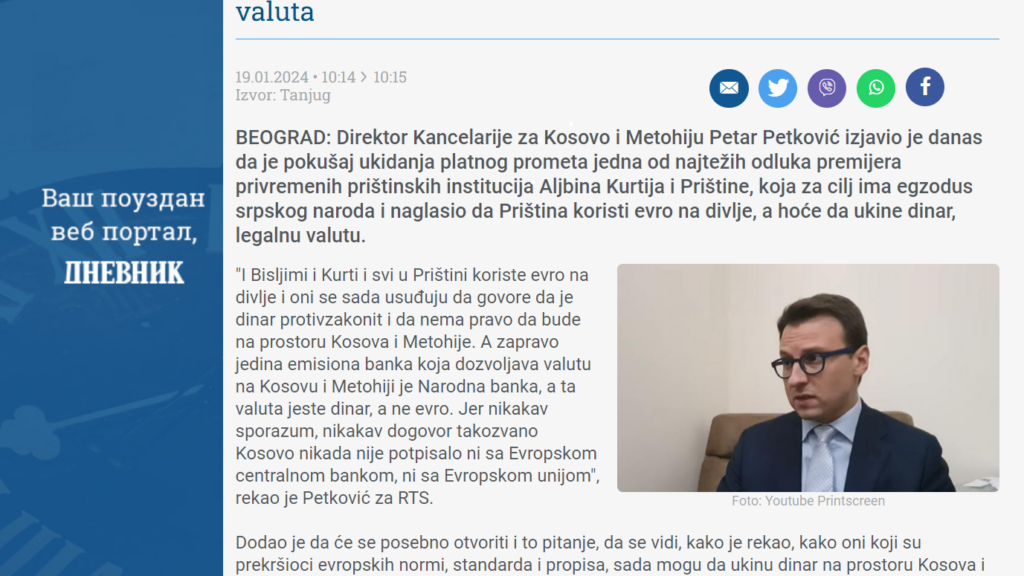The decision to prohibit the use of the dinar as currency in Kosovo is the latest move by the Kosovo authorities, prompting a reaction from the Serbs. The official currency of the Republic of Serbia has been used in the northern municipalities for transactions across various sectors.
Despite current legislation and regulations designating the Euro as the sole official currency in the country, institutions have been aware since the end of the war that the dinar is being used as the official currency among Serbs. This has been evident and tolerated even in businesses in the north, where product prices are also listed in dinars. The prohibition of all dinar currency transactions by the Central Bank of Kosovo (CBK) has been interpreted by the Serbian List as a tendency to expel Serbs from Kosovo. However, these claims have been rejected by the authority that issued the decision.
The Board of the Central Bank of Kosovo (CBK), in its meeting held on December 27th, 2023, approved the regulation that comes into effect starting February 1st, 2024, stating that the sole currency for conducting cash transactions in Kosovo is the Euro.
"The only permitted currency for conducting cash transactions and in the payment system in the Republic of Kosovo is the Euro, as the sole currency in accordance with Article 11 of the Constitution of the Republic of Kosovo and Articles 16, 17, and 18 of Law No. 03/L-209 on the Central Bank of the Republic of Kosovo," says Article 35 of the regulation.
According to them, non-euro currencies can only be used for "physical preservation or in bank accounts," and they can be used for international payments and exchange.
However, as the regulation specifies, the exchange can only be carried out through institutions licensed for this service.
International community caught by "surprise"
The decision by the authorities to implement this measure in February triggered a reaction from the international community, which called for its postponement.
The Ambassador of the United States of America in Kosovo, Jeffrey Hovenier, after a meeting with the governor of the CBK, Ismaili Ahmeti, stated that sufficient time should be provided for effective transition and public communication to mitigate the negative impact on citizens.
“I reiterated U.S. concerns about the implementation of the amended regulation on cash operations.” said Hovenier.
Meanwhile, for the American ambassador in Serbia, Christopher Hill, the decision of the Central Bank of Kosovo was an "unnecessary surprise."
The QUINT countries also expressed concerns about the impact of the regulation, emphasizing the effect it might have on schools and hospitals.
"We are concerned about the impact of the regulation in particular on schools and hospitals, for which no alternative process seems viable at the moment. The regulation will also have a direct impact on the everyday lives of the overwhelming majority of Kosovo Serbs who receive payments/ financial assistance from Serbia. Having had an exchange on this issue with the Prime Minister on Friday, the Quint calls for the suspension of the enforcement of the regulation to allow a sufficiently long period of transition, and for clear and effective public communication." says the QUINT's statement.
The Government calls to defend constitutional principles
However, Prime Minister Albin Kurti, who met with representatives of the QUINT countries in his office, did not signal any potential postponement. In a press release, the Prime Minister's Office explained that Prime Minister Kurti emphasized the importance of respecting constitutionality and legality in the country by everyone, while simultaneously respecting the independence of authorities, in this case, the Central Bank.
However, Prime Minister Albin Kurti, who met with representatives of the QUINT countries in his office, did not signal any potential postponement. In a press release, the Prime Minister's Office explained that Prime Minister Kurti emphasized the importance of respecting constitutionality and legality in the country by everyone, while simultaneously respecting the independence of authorities, in this case, the Central Bank.
Responding to numerous complaints, even Kurti's deputy, Besnik Bislimi, stated that there was no way to cancel something that had never been allowed before.
Deputy Prime Minister Besnik Bislimi has said that in the CBK's regulation on "Cash Operations," neither the Dinar nor the currencies of any neighboring state are mentioned at all in the 40-page text of this regulation. According to him, any other interpretation is inaccurate and aims at manipulating public opinion. "Of course, the specific determination of the currency allowed to be used in all banking and non-banking transactions is also of particular importance, which, in the case of Kosovo, is only the EURO. Any citizen of the Republic of Kosovo who has acted contrary to this has consistently been on the side of the lawbreaker," he expressed.
The European Union calls on the parties to resolve the issue within the framework of the Brussels dialogue. Although they are aware that the decision aims to reduce counterfeiting, maintain financial stability, and increase the transparency of cash circulation in Kosovo, concerns about its impact on Serbian-majority communities have been raised in the EU.
"Especially in schools and hospitals, for which no alternative process seems appropriate at this moment. The regulation also has a direct impact on the daily lives of the majority of Serbs in Kosovo who receive payments and financial assistance from Serbia," they said in the EU.
They called for a sufficient transitional period to facilitate the negotiation of an agreement.
Government officials consistently invoke the Constitution when making decisions such as the one regarding the Dinar, even though there are other instances where the decisions of authorities are not implemented. The non-implementation of one of them, related to the properties of the Decani Monastery, was reminded by the Ambassador of the United Kingdom in Kosovo, Nicholas Abbott.
"I am very pleased to see calls for the implementation of the Constitution of Kosovo, whether it be the decision of the Constitutional Court regarding the lands of the Decani Monastery or Article 11," said Abbott.
The claim of the Serbian List
The Serbian List again blamed the Government of Kosovo for the decision, stating that this is a continuation of the plan to make life difficult for Serbs in Kosovo.
"After all the forms of institutional violence used against the Serbian people by the authoritarian regime of [Kosovo's Prime Minister] Albin Kurti, and after failing to expel all Serbs from Kosovo, he has now decided to ban the Dinar in Kosovo and thus directly threaten the physical survival of the Serbian people," says the Serbian List's response..
Moreover, according to the director of the Office for Kosovo in the Government of Serbia, Petar Petković, the decision aims to provoke the exodus of the Serbian population.

Foto:Dnevnik.rs
The decision regarding the Dinar has been extensively covered by the media in Serbia and local media in the northern part of the country. Some of them conveyed dissatisfaction from citizens who have expressed fear that they will no longer be able to receive salaries and pensions from Serbia. Since the end of the war, Serbia has maintained some institutions that Kosovo considers parallel. The largest number of employees is in the healthcare and education sectors, which operate under Serbia's system. Srećko Milaçiq,a professor at the Parallel Economic Faculty of North Mitrovica, has described the decision as politically motivated, aiming at the "rounding off of Kosovo's statehood." "The decision of the Central Bank of Kosovo is not intended to ease life in Kosovo, not only for Serbs but also for Albanians," he expressed.
For years, dinars in Kosovo have entered through the Central Bank of Serbia, which has a vault in the Municipality of Leposaviq. The money was then transported by the currency transport company "Henderson."
*This article is published as part of the Western Balkans Regional Initiative against disinformation. “Western Balkans Anti-Disinformation Hub: exposing malign influences through watchdog journalism.”




























































